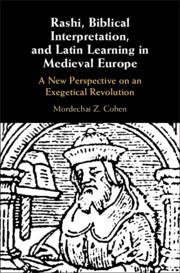 Rashi, Biblical Interpretation, and Latin Learning in Medieval Europe
Rashi, Biblical Interpretation, and Latin Learning in Medieval Europe Published online by Cambridge University Press: 15 April 2021
Rabbi Solomon Yitzhaqi (1040–1105), known as Rashi, is perhaps the most influential Jewish Bible interpreter of all time. A native of Troyes in the French county of Champagne, Rashi traveled in his youth to study for a decade in the Rhineland talmudic academies (yeshivot) of Mainz and Worms, then the intellectual center of the Ashkenazic (Franco-German) Jewish world. He returned to Troyes around 1070 and established a vibrant school of Jewish learning that ultimately drew from the best and brightest students of the Ashkenazic community, who would, in turn, become its leading rabbinic figures in the twelfth century. Rashi’s literary output centers on two major works: his Talmud commentary and his Bible commentary, each monumental in its own right. Drawing upon his training in the Rhineland academies by the disciples of the renowned Rabbenu (“our rabbi/master”) Gershom ben Judah (c. 960–1028), known as the “luminary of the diaspora,” Rashi composed a line-by-line commentary on virtually the entire Talmud, the central rabbinic work that embodies the halakhah (Jewish law). Continually perfected throughout his lifetime, Rashi’s Talmud commentary is comprised of lemmas and gloss-type notes that elucidate this highly complex and cryptic multi-volume rabbinic legal work. Though innovative in quality and style, its lineage can be traced to earlier exegetical work in the Rhineland academies, from which would emanate the Talmud commentary of “the sages of Mainz,” a collective work rooted in the teachings of Rabbenu Gershom that was in the process of formation in Rashi’s day, reaching its final form in the twelfth century.
To save this book to your Kindle, first ensure no-reply@cambridge.org is added to your Approved Personal Document E-mail List under your Personal Document Settings on the Manage Your Content and Devices page of your Amazon account. Then enter the ‘name’ part of your Kindle email address below. Find out more about saving to your Kindle.
Note you can select to save to either the @free.kindle.com or @kindle.com variations. ‘@free.kindle.com’ emails are free but can only be saved to your device when it is connected to wi-fi. ‘@kindle.com’ emails can be delivered even when you are not connected to wi-fi, but note that service fees apply.
Find out more about the Kindle Personal Document Service.
To save content items to your account, please confirm that you agree to abide by our usage policies. If this is the first time you use this feature, you will be asked to authorise Cambridge Core to connect with your account. Find out more about saving content to Dropbox.
To save content items to your account, please confirm that you agree to abide by our usage policies. If this is the first time you use this feature, you will be asked to authorise Cambridge Core to connect with your account. Find out more about saving content to Google Drive.